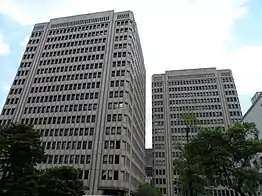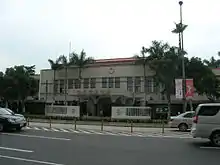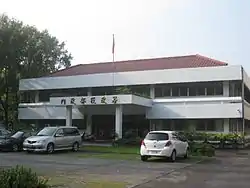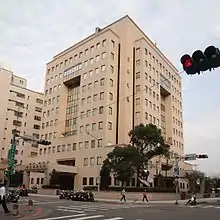Ministry of the Interior (Taiwan)
The Ministry of the Interior (MOI; Chinese: 內政部; pinyin: Nèizhèngbù; Pe̍h-ōe-jī: Luē-chèng-pō͘) is a cabinet level policy-making body, governed under the Executive Yuan of the Republic of China (Taiwan). It is the fundamental executive yuan agency responsible for home affairs and security throughout Taiwan, including population, land, construction, military service administration, national emergency services, local administration systems, law enforcement and social welfare (prior to 23 July 2013).[1]
| 內政部 Nèizhèng Bù (Mandarin) Nui-chṳn Phu (Hakka) | |
 | |
 | |
| Agency overview | |
|---|---|
| Jurisdiction | Republic of China (Taiwan) |
| Headquarters | Zhongzheng, Taipei |
| Minister responsible |
|
| Parent agency | Executive Yuan |
| Child agencies |
|
| Website | www.moi.gov.tw |
Core functions
It closely monitors the rights of the residents and every aspect of national development to ensure steady progress of the nation, strengthen social peace and order, and upgrade the quality of citizens' lives.
The Ministry strives to achieve the following:[2]
- Accomplish government reform to boost government vitality;
- Care for the minorities;
- Promote a fair military service system;
- Implement pragmatic growth management to promote sustainable development;
- Reinforce police administration reform;
- Strengthen crisis management to build a comprehensive disaster prevention system;
- Manage the goals to rebuild the Nation into a beautiful hometown;
- Implement walk-around management and close planning/control
Duties
In accordance to the Ministry of Interior Organization Act, the Ministry is charged with the following:
- National internal affairs administration.
- The Ministry bears the responsibilities to direct and monitor the highest-ranking local officials in the execution of tasks charged by the Ministry.
- For direct administration affairs, the Ministry is charged with the authority to order or take disciplinary actions against the highest-ranking local officials. When an official is suspected of conducting illegal acts or overstepping his/her authority, this local official may be suspended or removed pending a resolution from an Executive Yuan meeting.
Administrative divisions
Department structure
The Ministry is currently organized into five departments, one office, four sections, six committees, and one center to share the responsibilities.
- Department of Civil Affairs: in charge of local administration, local self-governing, border administration, public properties, political organizations, elections, religions, rites, funeral, rituals, and ceremonies, historical site investigation, maintenance, and registration, and other civil affairs.
- Department of Household Registration Affairs: in charge of household registration administration, nationality administration, population policies, census, national identification cards, name-usage and registration, migration planning, and other population affairs.
- Department of Land Administration: in charge of land surveys and registrations, land value assessments, equalization of land rights, land entitlement investigations, land consolidation, land expropriation, land utilization, territorial administration, and other land administration affairs.
- The Cooperative and Civil Associations Preparatory Office
Furthermore, the Ministry is also set up with sixteen social administration units and two land administration units, which are directly under the management of the Ministry as second level agencies.
Administrative agencies under the Ministry of Interior
- Architecture and Building Research Institute
- Central Police University
- Construction and Planning Agency
- Land Consolidation Engineering Bureau
- National Airborne Service Corps
- National Conscription Agency
- National Fire Agency
- National Immigration Agency
- National Land Surveying and Mapping Center
- National Police Agency
Ministers
.jpg.webp)
Non-partisan/ unknown Kuomintang (Nationalist) Democratic Progressive Party People First Party
| № | Name | Term of Office | Days | Political Party | Premier | |
|---|---|---|---|---|---|---|
| 11 | Hsu Ching-chung (徐慶鐘) | 3 June 1966 | 1 June 1972 | 2190 | Kuomintang | Yen Chia-kan |
| 12 | Lin Chin-sheng (林金生) | 1 June 1972 | 11 June 1976 | 1471 | Kuomintang | Chiang Ching-kuo |
| 13 | Chang Feng-hsu (張豐緒) | 11 June 1976 | 1 June 1978 | 720 | Kuomintang | Chiang Ching-kuo |
| 14 | Chiu Chuang-huan (邱創煥) | 1 June 1978 | 1 December 1981 | 1279 | Kuomintang | Sun Yun-suan |
| 15 | Lin Yang-kang (林洋港) | 1 December 1981 | 1 June 1984 | 913 | Kuomintang | Sun Yun-suan |
| 16 | Wu Po-hsiung (吳伯雄) | 1 June 1984 | 22 July 1988 | 1512 | Kuomintang | Yu Kuo-hua |
| 17 | Hsu Shui-teh (許水德) | 22 July 1988 | 1 June 1991 | 1044 | Kuomintang | Yu Kuo-hua Lee Huan Hau Pei-tsun |
| 18 | Wu Po-hsiung (吳伯雄) | 1 June 1991 | 15 December 1994 | 1293 | Kuomintang | Hau Pei-tsun Lien Chan |
| 19 | Huang Kun-huei (黃昆輝) | 15 December 1994 | 10 June 1996 | 543 | Kuomintang | Lien Chan |
| 20 | Lin Fong-cheng (林豐正) | 10 June 1996 | 15 May 1997 | 339 | Kuomintang | Lien Chan |
| 21 | Yeh Chin-fong (葉金鳳) | 15 May 1997 | 5 February 1998 | 266 | Kuomintang | Lien Chan Vincent Siew |
| 22 | Huang Chu-wen (黃主文) | 5 February 1998 | 20 May 2000 | 835 | Kuomintang | Vincent Siew |
| 23 | Chang Po-ya (張博雅) | 20 May 2000 | 1 February 2002 | 622 | Independent | Tang Fei Chang Chun-hsiung |
| 24 | Yu Cheng-hsien (余政憲) | 1 February 2002 | 9 April 2004 | 798 | Democratic Progressive Party | Yu Shyi-kun |
| 25 | Su Jia-chyuan (蘇嘉全) | 9 April 2004 | 25 January 2006 | 656 | Democratic Progressive Party | Yu Shyi-kun Frank Hsieh |
| 26 | Lee I-yang (李逸洋) | 25 January 2006 | 20 May 2008 | 846 | Democratic Progressive Party | Su Tseng-chang I Chang Chun-hsiung |
| 27 | Liao Liou-yi (廖了以) | 20 May 2008 | 10 September 2009 | 478 | Kuomintang | Liu Chao-shiuan |
| 28 | Jiang Yi-huah (江宜樺) | 10 September 2009 | 6 February 2012 | 879 | Independent | Wu Den-yih |
| 29 | Lee Hong-yuan (李鴻源) | 6 February 2012 | 3 March 2014 | 756 | People First Party | Sean Chen Jiang Yi-huah |
| 30 | Chen Wei-zen (陳威仁) | 3 March 2014 | 20 May 2016 | 809 | Kuomintang | Jiang Yi-huah Mao Chi-kuo Chang San-cheng |
| 31 | Yeh Jiunn-rong (葉俊榮) | 20 May 2016 | 15 July 2018 | 786 | Independent | Lin Chuan William Lai |
| 32 | Hsu Kuo-yung (徐國勇) | 16 July 2018 | Incumbent | 928 | Democratic Progressive Party | William Lai Su Tseng-chang II |
Access
The MOI building is accessible by NTU Hospital Station of the Taipei Metro on the Red Line.
References
- "Archived copy". Archived from the original on 2008-12-29. Retrieved 2009-01-10.CS1 maint: archived copy as title (link)
- "Archived copy". Archived from the original on 2008-12-29. Retrieved 2009-01-10.CS1 maint: archived copy as title (link)
External links
| Wikimedia Commons has media related to Ministry of the Interior (Republic of China). |




